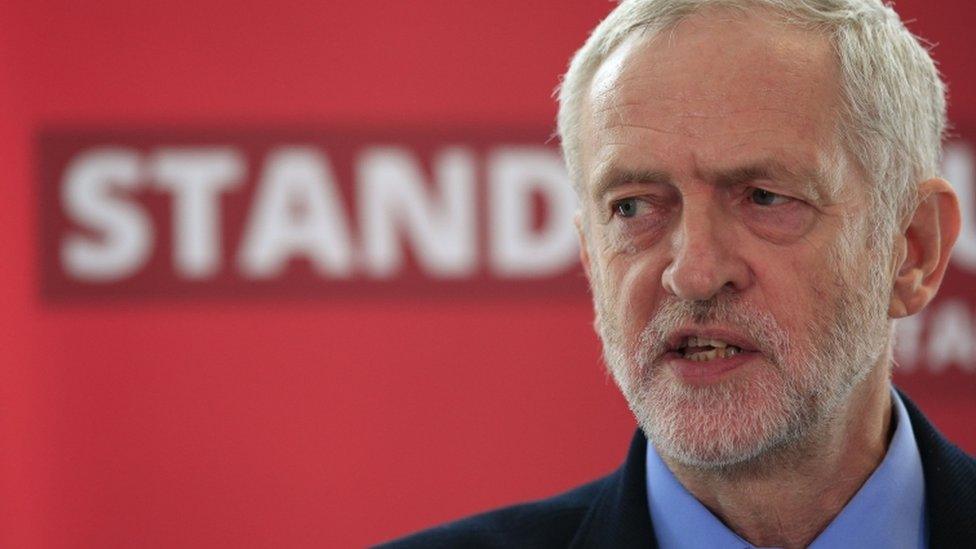Corbyn apologises for 'hurt' caused by anti-Semitism in Labour
- Published
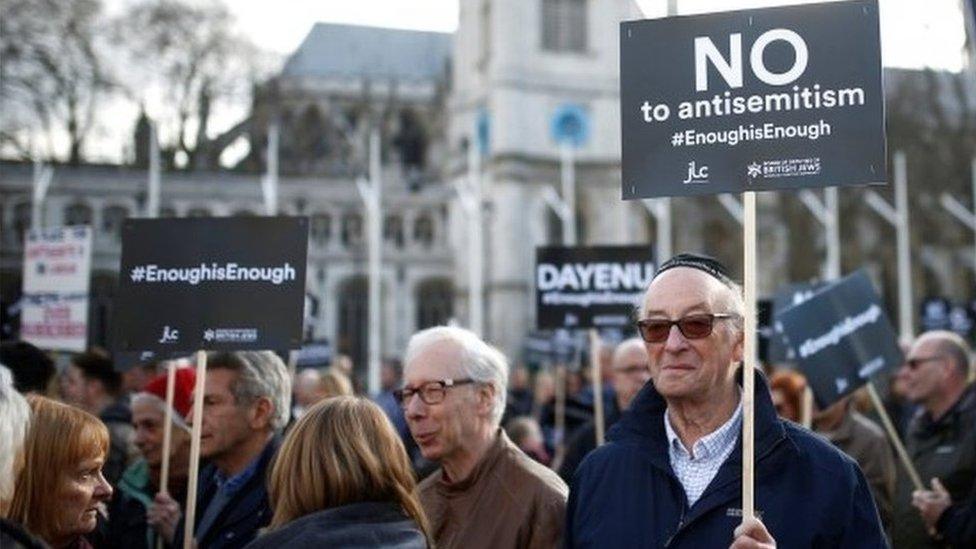
Jeremy Corbyn is seeking an "urgent meeting" with Jewish leaders to discuss their concerns about the rise of anti-Semitism in the Labour Party.
Jewish groups have accused the Labour leader of not doing enough to tackle it, and in a strongly-worded open letter told him "enough is enough".
Protesters gathered outside Parliament earlier, demanding action.
MP Luciana Berger told the crowd anti-Semitism had become "more commonplace, conspicuous and corrosive".
And her colleague Wes Streeting said the time was over for "mealy-mouthed words" from Mr Corbyn and action was needed to drain the "cesspit" of anti-Semitism.
Mr Corbyn repeated his apology to Jewish people in a letter to Jewish leaders ahead of the protest.
In it, he says: "I recognise that anti-Semitism has surfaced within the Labour Party, and has too often been dismissed as simply a matter of a few bad apples.
"This has caused pain and hurt to Jewish members of our party and to the wider Jewish community in Britain.
"I am sincerely sorry for the pain which has been caused, and pledge to redouble my efforts to bring this anxiety to an end."
He calls older forms of anti-Semitism such as the "idea of Jewish bankers and capitalists exploiting the workers" the "socialism of fools" - a reference to a phrase attributed to 19th Century German social democrat August Bebel.
But, in his most detailed rejection of anti-Jewish prejudice yet, the Labour leader says "newer forms of anti-Semitism have been woven into criticism of Israeli governments".
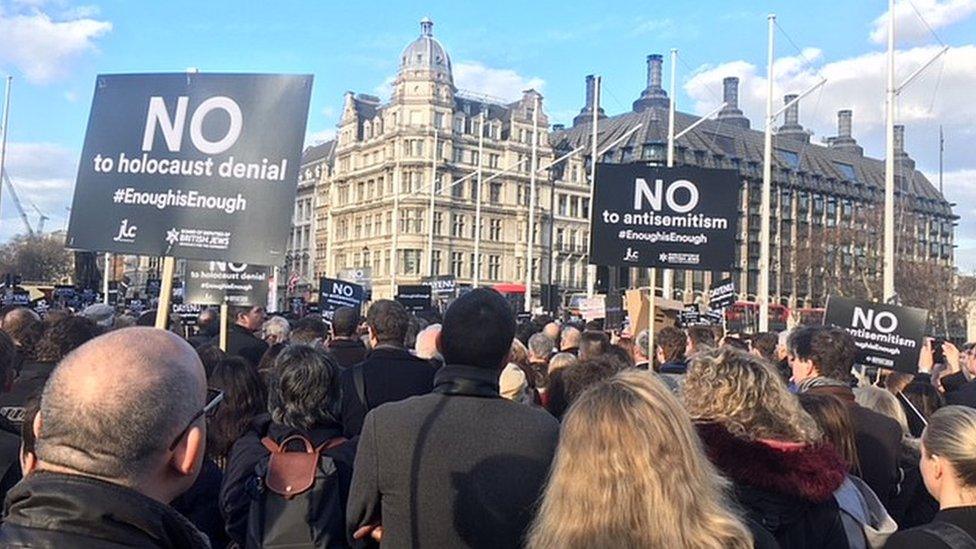
"Criticism of Israel, particularly in relation to the continuing dispossession of the Palestinian people, cannot be avoided," he said.
"Nevertheless, comparing Israel or the actions of Israeli governments to the Nazis, attributing criticisms of Israel to Jewish characteristics or to Jewish people in general and using abusive phraseology about supporters of Israel such as 'Zio' all constitute aspects of contemporary anti-Semitism.
"And Jewish people must not be held responsible or accountable for the actions of the Israeli government."
Mr Corbyn says "anti-Semitic attitudes have surfaced more often in our ranks in recent years" and he accepts criticism that the party "has been too slow in processing some of the cases that have emerged".
And he goes on to call for a meeting with Jewish leaders and pledge that the party will have "zero tolerance for anti-Semites".
Labour will also bring forward a programme of political education within the party "to increase awareness and understanding of all forms of anti-Semitism," he adds.
In a statement on Sunday night, the Labour leader said he was "sincerely sorry" for the pain caused by "pockets of anti-Semitism" in the Labour Party.
On Monday, former PM Tony Blair told BBC's Newsnight that Mr Corbyn and the people around him did not understand the seriousness of the party's problem with anti-Semitism - although he said he did not believe Mr Corbyn personally was anti-Semitic.
"It's got beyond the stage where words will solve this.
"He's going to have to show that he really understands the issue, that the people round him really understand it, and that he's prepared to act on it," he added.

At the protests
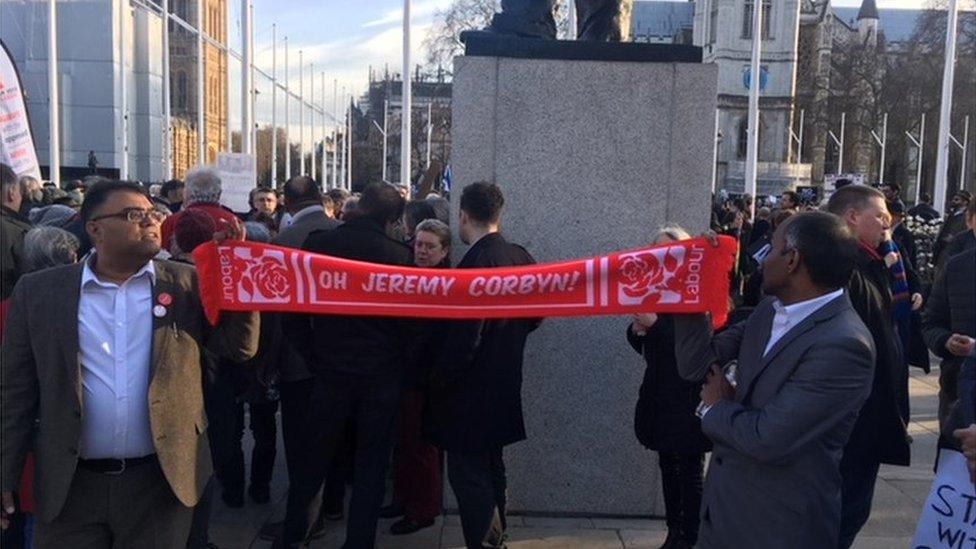
The Jewish Voice for Labour group led a counter-demonstration
By Brian Wheeler, BBC political reporter, in Parliament Square
A few of those present in Parliament Square were clearly no fans of the Labour Party or Jeremy Corbyn, although most I spoke to were Labour supporters who felt real anger about what they saw as Mr Corbyn's "soft" stance on anti-Semitism.
One man told me the party was in the grip of a "horrible, pernicious" form of racism.
Tim, from Bermondsey, told me: "I have been a member of the Labour Party since 1981 but I never thought I would be in the position of standing outside Parliament complaining about the treatment of our Jewish comrades."
The counter-demonstration organised by Jewish Voice for Labour was smaller, but everyone I spoke to was a Labour Party member - and they were all passionate supporters of Mr Corbyn, who felt he was being persecuted unfairly.
One man was handing out "Labour against the witch hunt" leaflets.
Another gave a speech attacking the Jewish Board of Deputies, ending with the battle cry: "Freedom for Palestine, Corbyn for prime minister!"
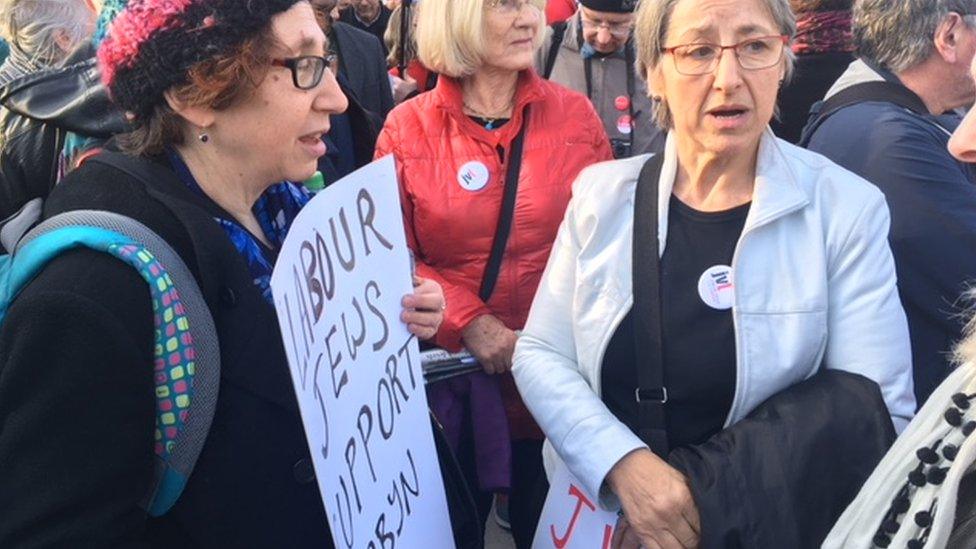
Leah Levine, the co-chair of Jewish Voice for Labour, did not deny there was some anti-Semitism in Labour just as, she said, there was in society as a whole - but she argued it was being blown out of proportion by opponents of Mr Corbyn - and that anti-Semitism was a far bigger problem on the right.
"We are not a racist movement," she told me.

The Board of Deputies of British Jews and the Jewish Leadership Council said in an open letter to Labour MPs there has been a "repeated institutional failure" to properly address anti-Semitism.
It accuses Mr Corbyn of being unable to "seriously contemplate anti-Semitism, because he is so ideologically fixed within a far-left world view that is instinctively hostile to mainstream Jewish communities".
The organisations refer to Mr Corbyn's apparently supportive message to the creator of an allegedly anti-Semitic mural in 2012 and his attendance at "pro-Hezbollah rallies".
They say the Labour leader has "sided with anti-Semites" either because of "the far left's obsessive hatred of Zionism" or "a conspiratorial world view in which mainstream Jewish communities are believed to be a hostile entity, a class enemy".
The letter says those who push anti-Semitic material view Mr Corbyn as "their figurehead" and that he is "the only person with the standing to demand that all of this stops".
Jonathan Arkush says Jeremy Corbyn "needs to take action" against anti-Semitism
The letter was due to be delivered to a meeting of Labour MPs and peers, although the Labour leader is not expected to attend.
The protest was held outside the Houses of Parliament, with a number of Labour MPs - including Liz Kendall, Ruth Smeeth, John Woodcock and Ian Austin - joining members of the Jewish community.
Labour MP John Mann said anti-Semites needed to be "driven out" of the party.
"The very existence of my Labour Party is at stake," he said.
"It is time for Jeremy Corbyn to act."
At the same time, a counter-demonstration by pro-Corbyn Jewish Labour members was staged nearby.
In a statement, the Jewish Voice for Labour group said it was "appalled" by the Board of Deputies' letter.
"They do not represent us or the great majority of Jews in the party who share Jeremy Corbyn's vision for social justice and fairness.
"Jeremy's consistent commitment to anti-racism is all the more needed now."
In 2016 an inquiry into anti-Semitism in the Labour Party, led by Shami Chakrabarti, said the party was not overrun by racism but there was "too much clear evidence... of ignorant attitudes".
It followed the suspension of MP Naz Shah and ex-London mayor Ken Livingstone amid anti-Semitism claims.


- Published25 March 2018
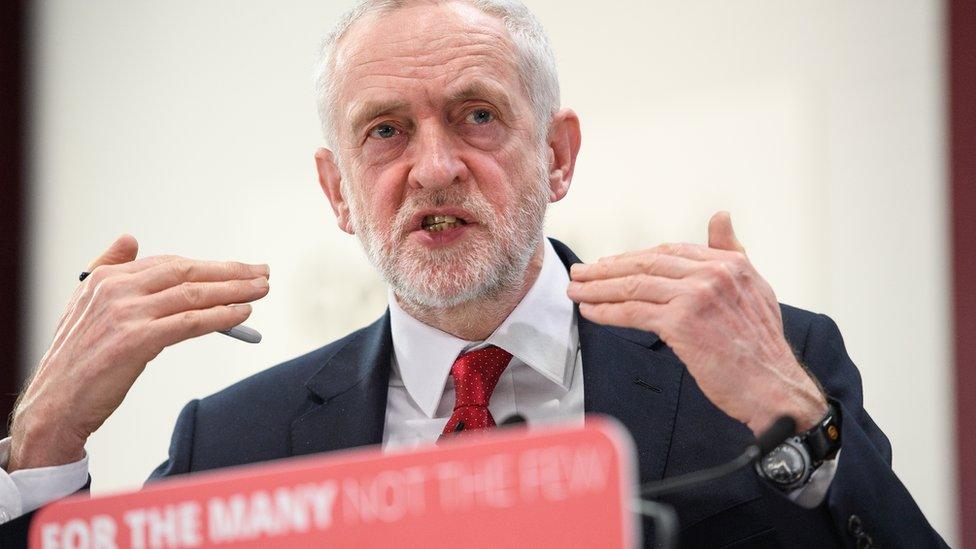
- Published25 March 2018
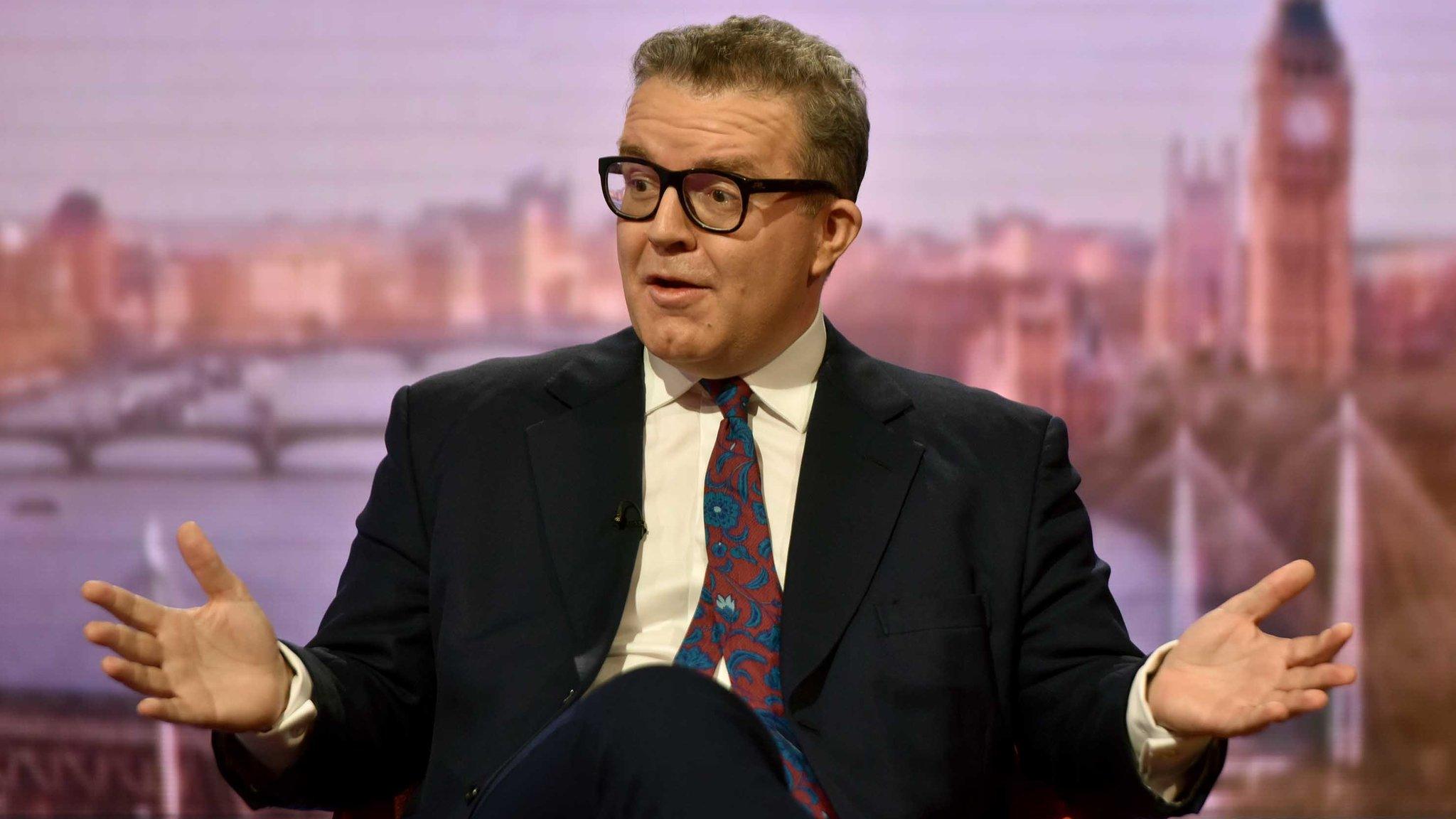
- Published23 March 2018
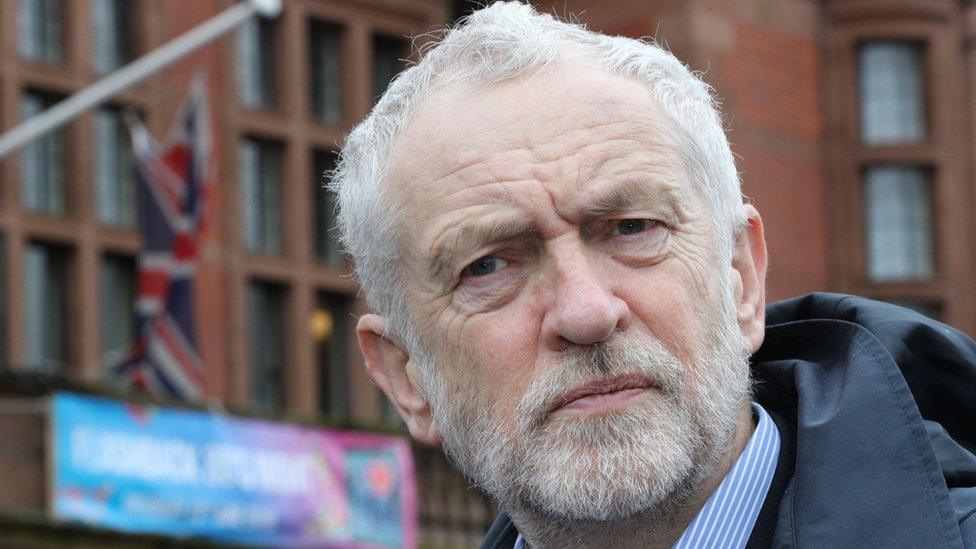
- Published30 June 2016
